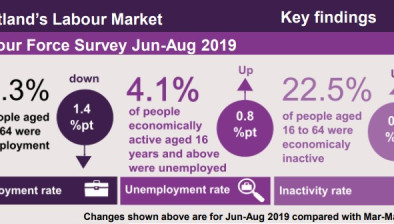Wage stagnation looms despite Scottish employment rise

Ann Frances Cooney
Scotland’s labour market shows resilience despite ongoing economic uncertainty, according to the latest figures for September to November 2024.
The employment rate rose by 1% over the quarter to 74.1%, while the unemployment rate fell by 0.2% to 3.8%. Both figures are slightly below the UK averages.
Ann Frances Cooney, employment expert and partner at DWF, commented: “The early seasonally adjusted estimates for December 2024 indicate that median monthly pay for payrolled employees in Scotland was £2,485, an increase of 4.8% compared with December 2023.
“This is lower than the growth in median pay for the UK over the same period. With employer National Insurance contributions rising in April 2025 we are likely to see some of this cost passed on to employees through wage stagnation.
“As we look at the year ahead we predict some trepidation across the labour market as employers grapple with the raft of employment legislation which is being introduced by the government – a cautious approach to recruitment and a focus on retention of core talent are both likely. We would encourage employers to engage in the extensive consultation programme so that they can help shape the employment landscape.”
Deputy First Minister and Cabinet Secretary for Economy and Gaelic Kate Forbes said: “These figures show that our labour market is proving resilient despite a challenging economic environment. It’s encouraging to see payrolled employment remains close to record levels and Scotland has higher median monthly pay than the UK.
“The First Minister will tomorrow (Wednesday) outline his priorities for Scotland’s economy, including closer relations with the EU and the need for the UK Government to introduce a migration policy tailored to Scotland’s distinct needs and bolster our working-age population.
“The Scottish Government is also committed to getting more people into work, which is why our draft Budget was developed in partnership with businesses and includes £90 million for employability services.”









